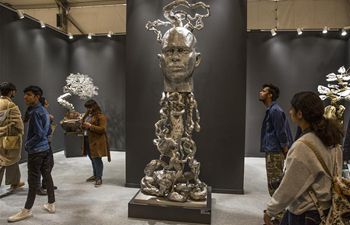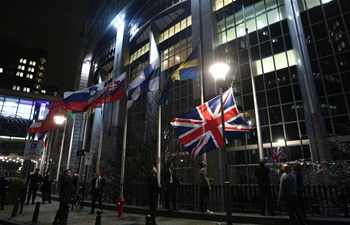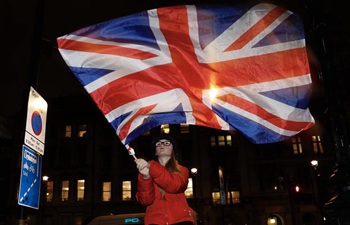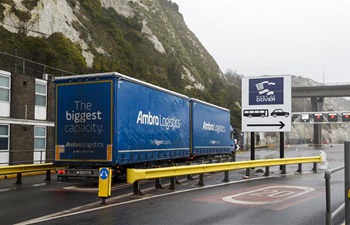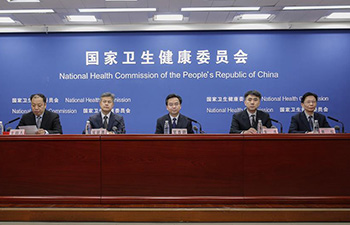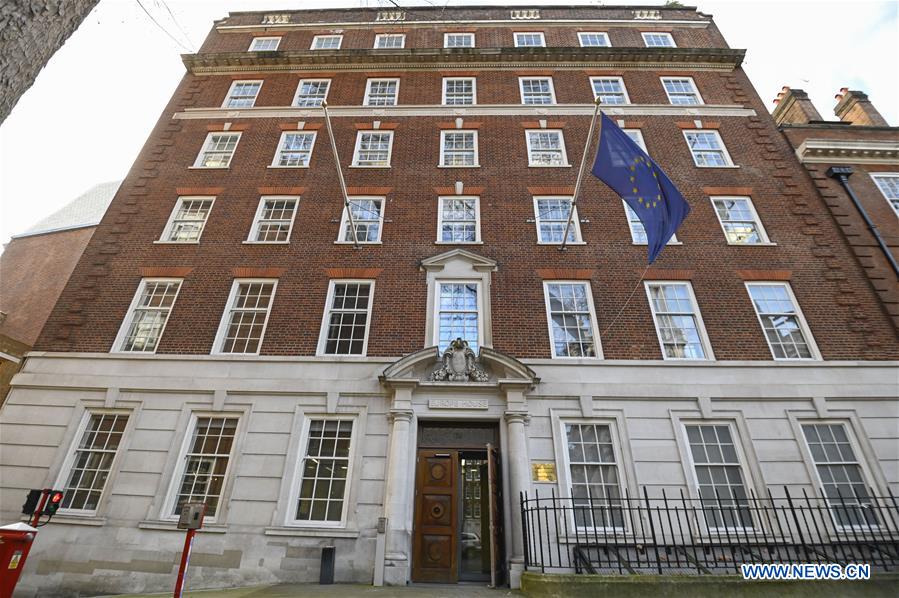
Photo taken on Feb. 1, 2020 shows the Europe House in London, Britain. Britain officially left the European Union (EU) on Friday, putting an end to its 47-year-long membership of the world's largest trading bloc. (Photo by Stephen Chung/Xinhua)
BRUSSELS, Jan. 31 (Xinhua) -- Tears, cheers and an array of mixed feelings hung over Europe on Friday as Britain officially left the European Union (EU), ending its 47-year membership with the world's biggest trading bloc.
The historic moment came under the curtain of a chilly night, and the Union Jack was hauled down from outside the European Parliament.
For many in the EU, it was an inevitably tough and emotional moment when Brexit materialized after three and a half years of turmoil since the summer of 2016.
However, when the sun rises again on Feb. 1, the EU will open a new chapter of its history, with its friendship and partnership with Britain remaining intimate and few substantial changes on both sides of the English Channel anticipated during an 11-month transition period.
Moreover, leaders of the EU as well as remaining member states have pledged to turn Brexit into an opportunity to forge a more competitive, integrated and influential bloc, long considered a carrier of peace, well-being, common values and identity in a multilateral world.
FAREWELL MOMENT
Bidding farewell to Britain, European Commission President Ursula von der Leyen repeatedly said the EU wants to have the best possible relationship with Britain, "but it will never be as good as membership."
David Sassoli, president of the European Parliament, said: "We stand at a new departure for Europe. We should not forget how much stronger we are when we act together."
"It's never a happy moment when someone leaves, but we are opening a new chapter," European Council President Charles Michel said, vowing that "we will devote all our energy to building a stronger, more ambitious EU."
In a podcast released on Friday evening, German Chancellor Angela Merkel said Brexit is "a deep cut for all of us, the 27 member states of the European Union and also for Germany."
She called on the remaining member states to do everything they can to successfully develop Europe, adding "an attractive, strong Europe is also a good partner for Britain."
"It is not a moment of joy," Austrian Foreign Minister Alexander Schallenberg said, advocating Britain's "closest possible connection" to the EU after Brexit.
ECONOMIC TIES
For dozens of years, the English Channel has seen free flows of goods as well as people between Britain and the European continent.
Such reality may not be taken for granted anymore after Brexit, if no agreement can be reached by the end of the transition period.
Cutting out close economic cooperation between Britain and the EU puts supply chains at risk involving autoparts, aerospace, food and several other sectors, according to a report by U.S. news outlet Politico.
Britain leaving the EU by January means one less uncertainty, which is good news for investors, noted Christine Lagarde, president of the European Central Bank.
She underlined that the biggest challenge was to come, namely the issue of reaching a trade deal between London and Brussels during the transition period.
Uncertainty concerning details of the transition period and the final agreement on future relations between the EU and Britain is putting a strain on the European economies as well as individual industries, according to Germany's Deutsche Bank.
Since future relations between the EU and Britain are still uncertain and a disorderly Brexit is still on the table, downside risks related to Brexit continue to weigh on the European economy.
"We will now negotiate very intensively with the British about future relationships, particularly in the area of trade and the economy," Merkel said.
SOLIDARITY
Hand in hand, members of the European Parliament sang Auld Lang Syne in an emotional farewell to Britain after giving the green light to the Brexit deal on Wednesday.
The EU had expanded several times from 6 to 28 member states throughout its history since 1957. In the historic and the largest expansion in 2004, Central and Eastern European countries such as Czech Republic and Poland joined the bloc, marking the re-unification of Europe after decades of division.
However, Britain opened a Pandora's box on June 23, 2016, as the outcome of a referendum upheld the decision to leave the EU, which marked the shrinkage of the EU membership for the first time in history.
Learning lessons from Brexit, European leaders vowed to strengthen solidarity within the EU and with Britain based on shared values.
"Fifty years of integration cannot disappear easily," Sassoli said, noting that the EU will work hard to build new relationships and protect the interest of its citizens.
COMPETITIVENESS
European leaders say deepening integration to enhance the EU's competitiveness and preserve its influence in the world should be a top priority.
French President Emmanuel Macron, in a televised address on Friday, called Britain's departure from the EU a "historic warning signal" that must be heard across Europe.
He called for deep reform within the bloc to better defend its interests and "make it more sovereign, more democratic."
Peter Griep, a director general at the Deutsche Bundesbank, said that with regard to Brexit, "strengthening our own market infrastructures -- the lifelines of the EU capital market -- will help Europe become a powerhouse in the global financial system."
Von der Leyen emphasized that Europe's challenges as well as opportunities related to climate change, the digital revolution, migration and foreign relations have not changed because of Brexit.
